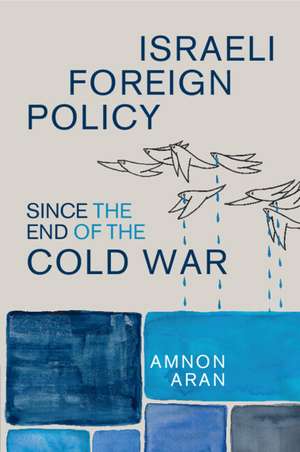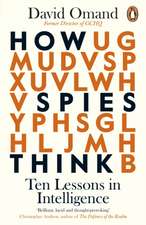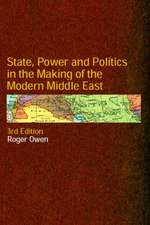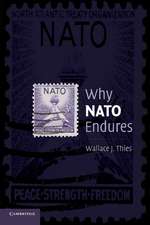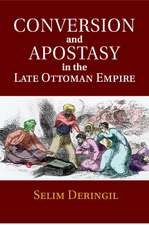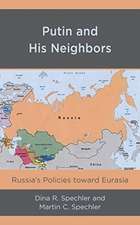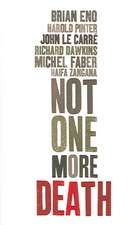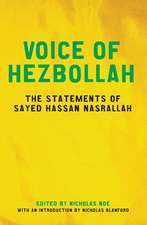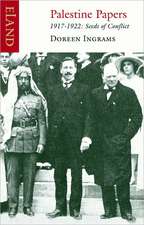Israeli Foreign Policy since the End of the Cold War: Cambridge Middle East Studies, cartea 61
Autor Amnon Aranen Limba Engleză Paperback – 29 iun 2022
| Toate formatele și edițiile | Preț | Express |
|---|---|---|
| Paperback (1) | 313.38 lei 6-8 săpt. | |
| Cambridge University Press – 29 iun 2022 | 313.38 lei 6-8 săpt. | |
| Hardback (1) | 704.16 lei 6-8 săpt. | |
| Cambridge University Press – 16 dec 2020 | 704.16 lei 6-8 săpt. |
Din seria Cambridge Middle East Studies
-
 Preț: 267.61 lei
Preț: 267.61 lei -
 Preț: 229.88 lei
Preț: 229.88 lei -
 Preț: 291.17 lei
Preț: 291.17 lei -
 Preț: 161.23 lei
Preț: 161.23 lei -
 Preț: 186.71 lei
Preț: 186.71 lei -
 Preț: 384.48 lei
Preț: 384.48 lei -
 Preț: 186.71 lei
Preț: 186.71 lei -
 Preț: 199.05 lei
Preț: 199.05 lei -
 Preț: 158.77 lei
Preț: 158.77 lei -
 Preț: 190.38 lei
Preț: 190.38 lei -
 Preț: 291.69 lei
Preț: 291.69 lei - 9%
 Preț: 628.35 lei
Preț: 628.35 lei - 8%
 Preț: 530.55 lei
Preț: 530.55 lei -
 Preț: 297.53 lei
Preț: 297.53 lei -
 Preț: 238.72 lei
Preț: 238.72 lei -
 Preț: 227.12 lei
Preț: 227.12 lei -
 Preț: 252.21 lei
Preț: 252.21 lei -
 Preț: 240.63 lei
Preț: 240.63 lei - 11%
 Preț: 581.66 lei
Preț: 581.66 lei -
 Preț: 211.40 lei
Preț: 211.40 lei - 11%
 Preț: 636.52 lei
Preț: 636.52 lei -
 Preț: 430.38 lei
Preț: 430.38 lei -
 Preț: 419.19 lei
Preț: 419.19 lei -
 Preț: 432.67 lei
Preț: 432.67 lei -
 Preț: 284.39 lei
Preț: 284.39 lei -
 Preț: 294.90 lei
Preț: 294.90 lei -
 Preț: 278.34 lei
Preț: 278.34 lei -
 Preț: 325.50 lei
Preț: 325.50 lei -
 Preț: 394.50 lei
Preț: 394.50 lei -
 Preț: 283.25 lei
Preț: 283.25 lei -
 Preț: 206.39 lei
Preț: 206.39 lei -
 Preț: 252.03 lei
Preț: 252.03 lei
Preț: 313.38 lei
Nou
59.97€ • 65.12$ • 50.38£
Carte tipărită la comandă
Livrare economică 23 aprilie-07 mai
Specificații
ISBN-10: 1107686687
Pagini: 460
Dimensiuni: 152 x 229 x 24 mm
Greutate: 0.61 kg
Editura: Cambridge University Press
Colecția Cambridge University Press
Seria Cambridge Middle East Studies
Locul publicării:New York, United States
Cuprins
Introduction; 1. Entrenchment; 2. Redirection; 3. On the brink of peace?; 4. Engagement incomplete; 5. Engagement under assault; 6. The dividends of engagement; 7. Unpicking the Oslo Accords; 8. Backtracking; 9. Just beyond reach; 10. Between engagement and unilateralism; 11. In search of a foreign policy paradigm; 12. A perfect storm; 13. The road map for regime change; 14. The resurgence of unilateralism; 15. Events dear boy, events; 16. The end of the road; 17. Vulnerable ties; Epilogue; Index.
Recenzii
'This is a deeply researched, clearly presented, original, and illuminating study with a sharp focus on the interplay between domestic politics and foreign policy. It also has the merit of placing Israel's policy towards the Arabs in the wider context of its relations beyond the region. It should be of great value to both students and scholars.' Avi Shlaim, University of Oxford
' …this book focuses on analysis of the Israeli Palestinian conflict and relations with its Arab neighbours. Aran describes the peace process of the 1990s, which culminated in the signing of the first and second Oslo accords. This was followed by the gradual unpicking of the agreements and Israel's unilateral decisions to withdraw from the Gaza Strip and Lebanon. Despite decades of contrary evidence both sides apparently continue to believe that using force will bring the conflict to an end.' Margot Light, International Affairs
'At its core, the book is an historical account that traces chronologically the most important developments in Israeli foreign policy over the last three decades, yet it does not read like a typical history book, primarily thanks to the author's narrative talent. Aran is able to often make history come alive on the page by painting detailed pictures of events and political figures, thus giving readers the impression that they are actually watching occurrences unfold before their very eyes. … Israel's Foreign Policy since the End of the Cold War represents an engaging and informative read for Middle East scholars and students alike, as well as for the general public, and will undoubtedly remain a solid reference book for years to come.' Raluca Moldovan, Studia Europaea
'Amnon Aran's Israeli Foreign Policy since the End of the Cold War provides a comprehensive and insightful account of major aspects of Israeli foreign policy in the past three decades. Aran constructs a useful analytic framework - entrenchment, engagement, and unilateralism - to view Israel's foreign policy through ... I would recommend Israeli Foreign Policy since the End of the Cold War to scholars and students of Middle East Studies, Israel Studies, and foreign policy studies. The book is written in an accessible and engaging style that will also attract readers outside academia.' Yael S. Aronoff, Middle East Journal
'Israeli Foreign Policy since the End of the Cold War is comprehensive for its account of this period, and significant for its detailed illustration of the interplay between domestic politics and foreign policymaking. It will be essential reading for all interested in Israel's foreign policy. For experts, this is an indispensable, richly sourced reference; for a broader audience, Aran presents a wealth of information to go beyond the simplistic accounts of Israel and navigate a complex foreign policy system.' Bariş Kersgin, Political Science Quarterly
Descriere
This is the first study of Israeli foreign policy towards the Middle East and selected world powers including China, India, the European Union and the United States since the end of the Cold War. It provides an integrated account of these foreign policy spheres and serves as an essential historical context for the domestic political scene during these pivotal decades. The book demonstrates how foreign policy is shaped by domestic factors, which are represented as three concentric circles of decision-makers, the security network and Israeli national identity. Told from this perspective, Amnon Aran highlights the contributions of the central individuals, societal actors, domestic institutions, and political parties that have informed and shaped Israeli foreign policy decisions, implementation, and outcomes. Aran demonstrates that Israel has pursued three foreign policy stances since the end of the Cold War - entrenchment, engagement and unilateralism - and explains why.
